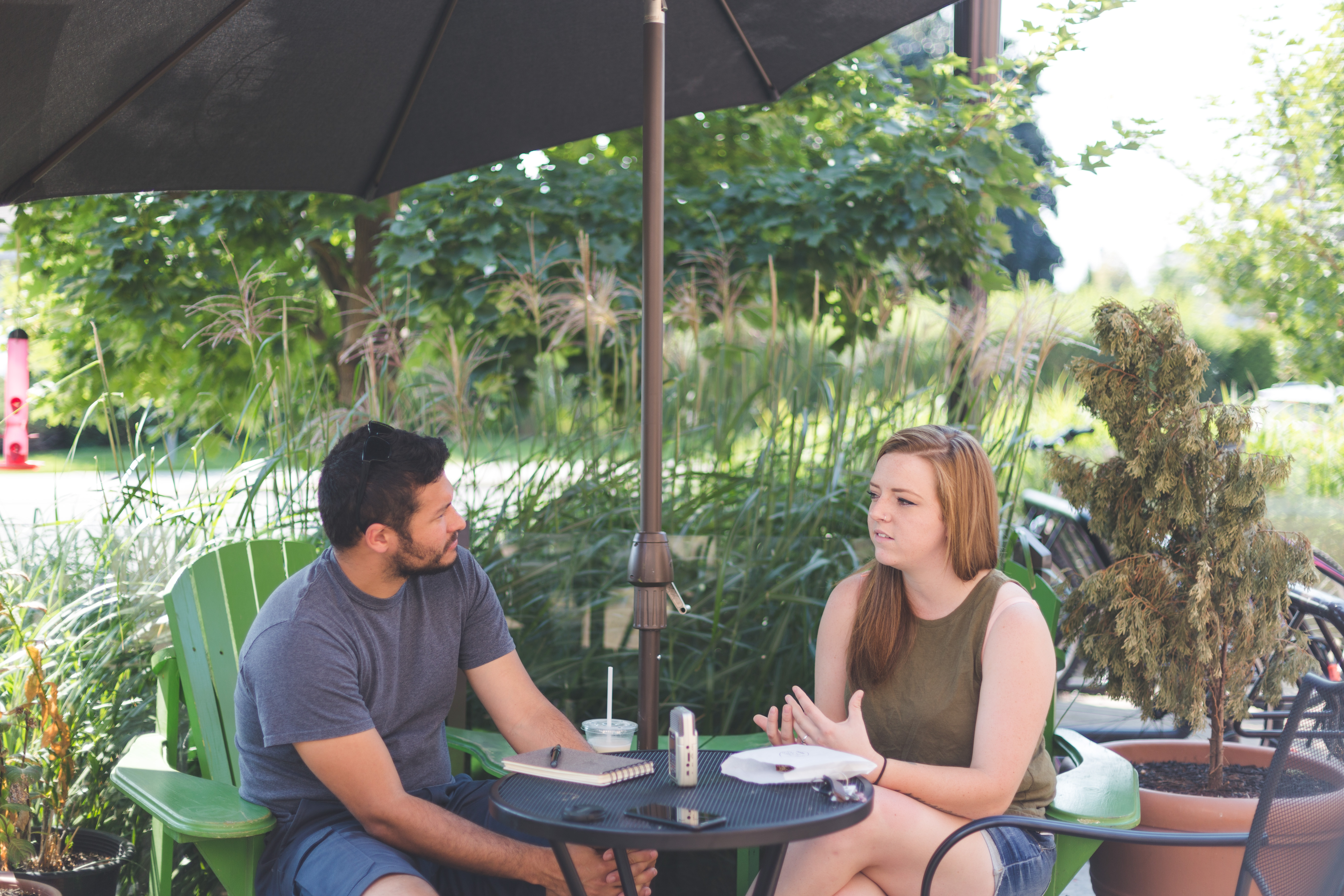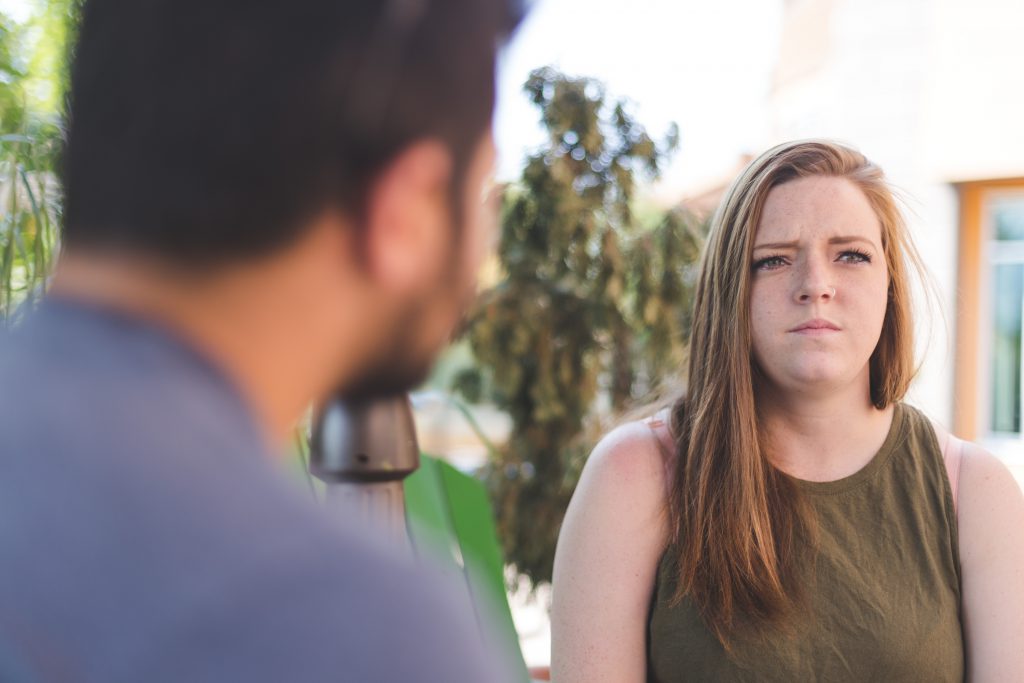Alexis’s Story
IT’S ABOUT ONE MILLION DEGREES in Kelowna, but Levi doesn’t seem to care. He stands tall and proud as the sun bounces off his shiny black coat, and the flies go crazy around his head. Despite the heat, he’s calm – so calm, in fact, that he decides that this is as good a time as any to put on a show.
The show is a comedy routine, and it goes like this: He’ll go to one corner of his enclosure, wait for Alexis to get really close, and then gallop away in another direction right when she’s about to get the halter over him. He does this over and over again, taunting her with a deep stare every time he goes by.
The first few times, Alexis laughs. But after the fourth time, Levi knows the show is over. This time as Alexis approaches, he stands patiently. When she’s by his side, she thanks him with a pat on the neck, and a couple of seconds later, the two are loping around the pen together.
“Levi can be a bit of a brat sometimes, but he absolutely loves to joke around,” says the 19-year-old with a smirk on her face. She’s been riding Levi for the last eight years, and in that time has developed a deep connection with him. “I love spending time with him. Every time we’re together life just seems to get better: I smile, my mind quiets down, and I just focus on riding.”
As the two move gracefully around the pen, Alexis demeanor changes completely. She seems unfazed by the bright sun and the flies and heat. There’s a large grin on her face, and all her worries seem to be lifted.
“It feels great to be with Levi. He’s actually been a huge part of my recovery because riding him allows me to reconnect with myself and focus on the now,” she’ll say later on. “I’m with him a lot, and every single time, I feel better when I’m done.”

ALEXIS GREW UP CLOSE BY, in a beautiful house with a gorgeous view of the mountains and a never-ending apple orchard in the back. Her early childhood here was idyllic: She’d spend her days running around the orchard with her siblings, playing with her neighbour’s horses, and exploring her family’s land.
“My childhood was awesome. I was born and raised on this beautiful farm, and for the first few years it felt like everything was together: My family was amazing, and I was super happy.”
Life was great. But things – as they sometimes do – would soon take a turn for the worse.
“I was 7 when my father passed away, and all of a sudden, I felt really, really lonely,” she remembers.
It was around this time that Alexis’s behaviour started to change. She began acting out at school and doing impulsive things to attract attention. She also started to feel different from her peers, and even though she was constantly surrounded by friends, she always felt alone.
That year she was diagnosed with Attention-Deficit/Hyperactivity Disorder (ADHD) and began taking medication for it. While that helped deal with some of her symptoms, something still felt wrong.
She didn’t know it at the time, but what Alexis was also starting to feel were the early signs of depression and anxiety.
“As time passed, the feelings of loneliness and of being different just got worse. I remember going out at recess time in middle school and saying something without thinking because I have ADHD, and then the rest of the day I’d sit in class so full of anxiety wondering why I had said those things,” she says. “It’s sad to think about it now, but even at that early age, I had started to dislike myself, and despite the fact that people said they loved me, I just couldn’t believe that this was true.”
“At the time I didn’t have the tools to change my behaviour.”
ACCORDING TO RESEARCHERS, one in five children who experience the early death of a parent experience mental health challenges. Studies show that these young people are more likely to suffer from depression and anxiety than their peers and are also more prone to substance use.
Unfortunately, by the time Alexis was in high school, she was dealing with all three of these things.
“The pain I felt got worse as I grew older. In high school, drinking became more acceptable and drugs started coming up at parties. I’m so impulsive and was just looking for anything to take the pain away, so I started drinking and using drugs, which just made everything worse,” she remembers.
By the time she was 15, Alexis had entered a cycle of unhealthy, self-destructive behaviour—although most people around her wouldn’t have been able to tell. At first, she was able to continue getting good grades at school, hang out with friends, and lead an apparently normal life. But as time passed, her descent into depression grew worse, and the mask of perfection that she had so carefully constructed around others began to lift.
Her mother was the first person to notice the extent of Alexis’s suffering—and did all she could to help. She dragged her to art therapy and equine (horse) therapy. They went to hypnosis and counselling, and visited treatment centres and psychiatrists. Whenever they’d try something new, things would improve for a bit, but Alexis wasn’t quite ready to change.
“The truth is that at the time I didn’t have the tools to change my behaviour,” Alexis recalls. “Trying to be ok was a constant fight, and I didn’t want to fight, so eventually I stopped caring, and lost myself completely: I wouldn’t shower, or brush my hair, and I didn’t care what I looked like. I would skip school every day and just couldn’t get it together.”
“Although everything inside of me said this isn’t what I was supposed to be doing, I just couldn’t stop. Something was going on, and I didn’t understand what it was.”

ALEXIS’S LIFE WOULD FINALLY CHANGE thanks to the intervention of a few dedicated teachers at her high school. As the end of senior year approached, all Alexis wanted was to graduate, so her teachers gave her an ultimatum: “We’ll make sure you graduate, but you have to promise to get help immediately,” they said.
The message resonated with Alexis. So the day after her senior prom, she left Kelowna with a high school diploma on her wall and a real desire to change her life around.
With her family’s support, she entered an in-patient treatment centre, where she spent eight weeks getting help for her mental health. It was a difficult process, but it proved to be helpful: Two years later, she’s sober and well – and no longer suffers from the depression and anxiety that had been such a large part of her life for years.
“I really want everyone to know that the addiction, self-harming and depression that they think only happens to the shy kid in the corner, can happen to anyone and is much more common than they think.”
Today, she finds wellness by attending weekly support group meetings, where she has encountered a caring and committed community, and by riding her horse Levi, who helps her out whenever she’s having a bad day and needs to unwind.
She also works as a dog groomer and gives talks at high schools around Kelowna, sharing her story with young people and parents. Her goal is to give them insight into what it’s like to live with a substance use disorder and depression and to show them that it’s possible to overcome these things.
“I really want everyone to know that the addiction, self-harming, and depression that they think only happens to the shy kid in the corner, can happen to anyone and is much more common than they think. I grew up in a great family, and I was quite popular going through school, and lots of people liked me, but it still happened to me,” she says.
She has learned to look at life one day at a time but hopes to continue supporting young people who are dealing with mental health challenges, working with them on an individual basis and inspiring them to deal with their challenges head on.
“For so many years I was so sensitive to people’s opinions of me that I didn’t accept what was happening to me and hid it from everyone,” she says. “While I still feed off of other people’s opinions, I’m at a much better point. Now I can say to myself and to others: I’m Alexis, take it or leave it.”
This story is part of a series aimed at sharing the experiences of young people across BC. As part of Foundry’s goal to work alongside young people, create connections and promote mental health and wellness, we are creating a platform for young people’s stories to be heard.
Article by Peter Mothe. Photography by Connor McCracken.
If you are in crisis, please call 1-800-784-2433.
Find out more about Foundry.